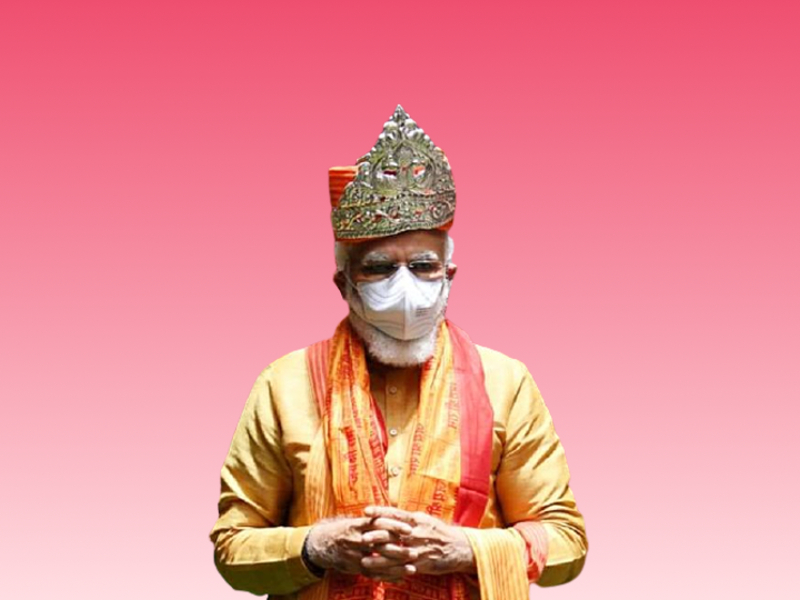By Pranav Patel
Yes, you read that right. It is futile to blame Modi for the many crises India faces today. The fulsome criticism of Modi assumes that he regarded adequate healthcare infrastructure and a thriving economy – which he has failed at – as primary duties of a prime minister from the BJP. This assumption is flawed on two levels. The first is continuing to believe in the charade of acche din and sabka saath sabka vikaas. The second and more serious flaw is overlooking Modi’s success (again, you read that right) in executing a privatization agenda that benefits crony capitalists, mixed with the RSS’ toxic, majoritarian Hindutva ideology to alter India’s social, cultural and political structures. The sole beneficiaries of Modi’s work are crony capitalists and religious fundamentalists, abetted by an unholy cocktail of “minimum government, minimum governance” and a majoritarian policy. Ensuring primacy for these two support groups has been Modi’s sole focus.
The acche din/sabka saath sabka vikaas slogans were smokescreens to mask the insidious alliance between corporate cronies and majoritarian Hindutva forces. While gullible masses lapped up PM Modi’s promises as a panacea for all ills, they failed to recognize that he was setting them on the road to damnation. The promises he actually fulfilled were those he made to the two lobbies that fostered a cult of personality around him: big corporates and industrialists thriving on wholesale privatization of every sector and the RSS and its tentacles that have run riot in the last seven years.
With breakneck speed, swiftness and efficiency, the Modi government is dismantling the vestiges of India’s public sector enterprises. Even the successful and profit-making public sector entities have been run down to the ground and made unviable for subsequent privatization at throwaway prices. While the economy has tottered over the last seven years, a small group of industrialists – all of whom back Modi – have seen a manifold increase in their wealth and expansion of their conglomerates. The transfer of wealth and power to a handful of billionaire businessmen – a key feature of the corporatization and globalization trend across the world – was accelerated in the last seven years, even as government investments in healthcare, education and social welfare declined. This was a key objective of the insidious alliance between the big corporates and the Modi-led BJP whose economic policy seems confined to de-regulation, privatization, tax sops for big corporates and high net worth individuals and the decimation of the public sector.
The RSS’ core goals of Ram Mandir, Abolition of Article 370, demonization of Muslims and other minorities, anti-conversion laws, and beef bans have all succeeded and pushed India to the cusp of turning into a majoritarian hardline Hindutva state. Never in its nearly hundred-year existence has the RSS come so close to achieving its goals. While riots, killings and communal attacks have happened during earlier regimes as well, they have seldom been normalized to such an extent with countless mob lynchings occurring across India since Mohamed Akhlaq’s killing in 2015. Systemic demonization of minorities and patronage of accused killers by ministers and government functionaries have never been so blatant since independence. Admirers of Gandhi’s killer Nathuram Godse accused of terrorism have been elected to Parliament on BJP tickets.
India’s frayed social fabric has been shredded with brutality and brazenness, seldom seen in liberal or democratic societies. Crushing any form of dissent by invoking draconian UAPA or NSA charges against journalists and human rights activists has become a norm. Despite criticism in the international press and a downgrading of India’s Democracy and Press Freedom status by recognized independent agencies, the government continues to clamp down on human rights.
The politicization and weakening of institutions like the Election Commission, judiciary, administrative services, police, and armed forces have created a void successfully exploited by the RSS and its allied organizations whose writ now runs across large parts of the country through vigilante groups like the gau-rakshaks and anti-Romeo squads. This is a far cry from the vision of our founding fathers enshrined in the constitution.
Today, the RSS influences policy decisions through elected ministers including the Prime Minister and Home Minister whose affiliation with the RSS is a matter of record. It is naive to expect this government would not have gone out of its way to organize the Kumbh Mela in early 2021. With the Ram Mandir verdict of the Supreme Court providing absolution to the criminal act of pulling down of a 400 year old structure, the Kumbh Mela just buttressed the Hindutva credentials of the Modi government further. Cancelling the Mela (after it was advanced by a year due to astrological reasons) or curtailing it would only have robbed the government of an ideal stage to cater to its Hindutva base.
Affirmative action for the oppressed and minorities in India is often maligned as “appeasement” politics by privileged sections of society. Ironically, vote-bank politics is dangerous for the wider society if it caters to a majoritarian agenda. The social and business elite is blind to this majoritarian appeasement (social and economic) for decades.
Any other government would also have certainly struggled in dealing with a pandemic of such severity. However, the key difference between the Modi-led dispensation and others is that the PM’s public perception (effectively managed and marketed by media and corporate lobbies which backed him) successfully masked his anti-people agenda – one that violates the governing principles of a modern, nation-state, the ethos of public spiritedness with a secular, liberal outlook. The COVID crisis has shattered that perception completely, exposing the nefarious deeds of a majoritarian government that only serves the social and economic elite. With it the misplaced hopes of millions of people have suddenly come crashing down.
Disclaimer :The opinions expressed within this article are the personal opinions of the author. AlignIndia does not take any responsibility for the content of the article.
(Pranav Patel is an alumnus of the Tata Institute of Social Sciences and blogs at pranav84blog.wordpress.com)


